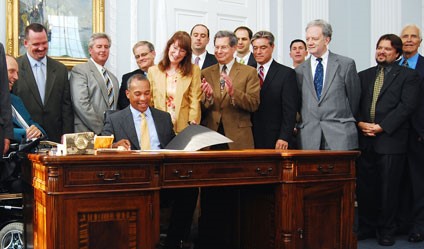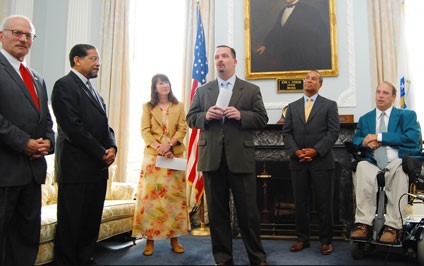- Ask your Massachusetts state legislators to continue their support for the National Popular Vote bill
- Send a letter-to-the-editor to Massachusetts newspapers
- National Popular Vote’s Facebook page
- National Popular Vote’s Twitter page
On August 4, 2010, Massachusetts governor Deval Patrick signed the signed the National Popular Vote bill, making Massachusetts the sixth state to enact the bill.


On July 27, 2010, the Massachusetts Legislature completed action on the National Popular Vote bill (H 4156) and sent it to Governor Deval Patrick for his consideration. The Senate's final vote on enactment was 28-9. On June 2, 2010, the Massachusetts House of Representatives passed the National Popular Vote bill by a 113-35 vote.
A survey of 800 Massachusetts voters conducted on May 23–24, 2010 showed 72% overall support for the idea that the President of the United States should be the candidate who receives the most popular votes in all 50 states.
Voters were asked, "How do you think we should elect the President: Should it be the candidate who gets the most votes in all 50 states, or the current electoral college system?" By political affiliation, support for a national popular vote was 86% among Democrats, 54% among Republicans, and 68% among others. By gender, support was 85% among women and 60% among men. By age, support was 85% among 18-29 year olds, 75% among 30-45 year olds, 69% among 46-65 year olds, and 72% for those older than 65. By race, support was 72% among whites, 82% among African-Americans, and 58% among Others. The survey was conducted by Public Policy Polling, and has a margin of error of plus or minus 3 1/2%.
Massachusetts voters were also asked a 3-way question in 2010, "Do you prefer a system where the candidate who gets the most votes in all 50 states on a nationwide basis is elected President, or one like the one used in Nebraska and Maine where electoral voters are dispensed by Congressional district, or one in which all of the state's electoral votes would be given to the statewide winner?" The results of this three-way question were that 68% favored a national popular vote, 16% favored awarding its electoral votes by congressional district, and 16% favored the existing statewide winner-take-all system (i.e., awarding all of a state's electoral votes to the candidate who receives the most votes statewide).
A survey of 800 Massachusetts voters conducted on June 3, 2008 showed 73% overall support for a national popular vote for President. By party, support was 82% among Democrats, 66% among independents, and 54% among Republicans. By age, support was 74% among 18-29 year olds, 69% among 30-45 year olds, 72% among 46-65 year olds, and 78% for those older than 65. By gender, support was 80% among women and 63% among men. By race, support was 75% among whites (representing 88% of respondents), 59% among African-Americans (representing 4% of respondents), 66% among Hispanics (representing 1% of respondents), and 57% among Others (representing 7% of respondents). The survey had a margin of error of plus or minus 3 1/2%.